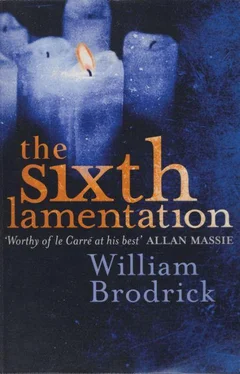William Brodrick - The Sixth Lamentation
Здесь есть возможность читать онлайн «William Brodrick - The Sixth Lamentation» весь текст электронной книги совершенно бесплатно (целиком полную версию без сокращений). В некоторых случаях можно слушать аудио, скачать через торрент в формате fb2 и присутствует краткое содержание. Жанр: Триллер, на английском языке. Описание произведения, (предисловие) а так же отзывы посетителей доступны на портале библиотеки ЛибКат.
- Название:The Sixth Lamentation
- Автор:
- Жанр:
- Год:неизвестен
- ISBN:нет данных
- Рейтинг книги:5 / 5. Голосов: 1
-
Избранное:Добавить в избранное
- Отзывы:
-
Ваша оценка:
- 100
- 1
- 2
- 3
- 4
- 5
The Sixth Lamentation: краткое содержание, описание и аннотация
Предлагаем к чтению аннотацию, описание, краткое содержание или предисловие (зависит от того, что написал сам автор книги «The Sixth Lamentation»). Если вы не нашли необходимую информацию о книге — напишите в комментариях, мы постараемся отыскать её.
The Sixth Lamentation — читать онлайн бесплатно полную книгу (весь текст) целиком
Ниже представлен текст книги, разбитый по страницам. Система сохранения места последней прочитанной страницы, позволяет с удобством читать онлайн бесплатно книгу «The Sixth Lamentation», без необходимости каждый раз заново искать на чём Вы остановились. Поставьте закладку, и сможете в любой момент перейти на страницу, на которой закончили чтение.
Интервал:
Закладка:
When I turned to go there was a priest standing behind me. He was short and badly shaven, with bags under his eyes. His name was Father Rochet.
12th April.
Father Rochet. He had known my father from school-days and would frequently drop by usually when I was going out. He always looked as if he’d slept badly I had never spoken to him for long as he was a man of few words. But I saw him a great deal, going into the flats in and around where we lived, which I suppose was strange because it was not his parish. He was a great one for carrying something under his coat. I used to think it was a bottle, though I know better now My father said he was always getting into trouble with his bishop, which Father Rochet thought very funny Anyway there he was, behind me in the hospital, looking as if he’d just got out of bed. I followed him into the corridor. Everything had been arranged, he said. I was to go with him and he would take me to the house of a friend. We would talk about my future another time.
Father Rochet took me in his car. Neither of us spoke. It was a black night and the rain was so heavy I could not recognise any streets or buildings. I remember watching the windscreen wipers and wondering how they worked. The water falling in sheets across the glass. Eventually we arrived. I opened the door and saw what I least expected or wanted: Parc Monceau.
Up those stairs I went, dripping everywhere. By now I was crying. When the door opened, Madame Klein scowled and shook her head. ‘For heaven’s sake, stop soaking the floor.’ Those were her first words.
My father died that night.
Father Rochet came to see me after the funeral. Again he hadn’t shaved properly, and this time I could have sworn he smelled ever so slightly of stale wine, which distracted me from taking on board what he said. It was my father’s wish that I now live with Madame Klein. He had seen to all the finances.
And so I believed family resources had sustained me in the past and would do so in the future. I didn’t realise they were both feeding me a story to save my dignity.
I wasn’t to know Father Rochet had introduced my father to Madame Klein when we first arrived in Paris; I wasn’t to know my father went out each day in a suit, then changed and earned his living cleaning floors. I wasn’t to know that Madame Klein was our landlady; that she had waived the rent from the outset; that she had given the piano to my father; that my lessons were free; that both of them were what some call saints.
13th April.
Madame Klein was the most extraordinary woman I have ever known. She must have been in her early seventies when I came to live with her. At first I thought maybe I was there to act as a nurse. Far from it. She was too busy to want any help.
Her husband had died about ten years earlier. He’d been a gifted violinist, and his death had come without any warning while performing on stage. From what she said it was rather like Tommy Cooper. He made an amusing aside, and then dropped down. Everyone laughed, including Madame Klein. They’d never had children, and extended family were out of reach and touch. So she found herself alone. She told me the first few years were the worst, and getting worse. And then she had an accident.
Madame Klein was an atrocious driver, always banging into things. On this day, for once, it was not her fault. A van collided into the side of her car, breaking her right wrist. She never played the piano professionally again. However, the van had been driven by a young woman who worked for a Jewish children’s welfare organisation, ‘Oeuvre de Secours Aux Enfants’ (OSE). Its headquarters had moved from Berlin to Paris in the early thirties, after the Nazis came to power. It became Madame Klein’s life, just when she thought she had nothing to live for.
You have to understand what it was like then. Thousands of refugees had flooded into France, with children separated from their parents. You’ve seen something similar on the news. It still goes on. Then, as now, people did what they could. So Madame Klein was out each day, doing I don’t know what. It was not something she talked about. But she often took her husband’s violin.
On some evenings there were meetings with friends she’d made through OSE. I was never present. But the same men and women came. To my child’s eye they were always dressed in black and arrived in a long shuffling line after dark. They gathered in the salon, with its low lights and drawn curtains. I thought it was terribly exciting. And I was desperate to know what they talked about. So I started listening at the door.
You’ll find, Lucy, as you get older you start seeing yourself from the outside. Particularly your childhood. You’ll see a child enacting her part innocently while you watch, knowing what is going to happen, unable to intervene. As for me, the need to intervene, if I could have done, comes later. For now I can see myself in my nightie, with bare feet, bent over by a great white door with beautiful shining brass handles. I’m trying to breathe as quietly as I can, looking through the keyhole at those gesticulating arms and solemn faces.
They never seemed to converse. It was always an argument, even when they agreed. What was going to happen next? That is what they fought over. Were they on the verge of the greatest pogrom they had ever known? And what was to be done? The killings had been under way since 1930. Within months of Hitler becoming Chancellor, there were camps. I remember one voice from the far side of the room say fearfully ‘If they’ve killed us in the street, they’ll kill us in the camps.’ And then a deep voice by the door spoke, so close to me I almost jumped back. It was Father Rochet. ‘You are not safe in France. You’re not safe anywhere.’ There was the most dreadful silence after that. Through the keyhole I could just make out an old man with a stick propped between his legs. He still had his dark hat and coat on. I can’t recall his name, but I’ve thought for years about his face, caught in the yellow lamplight. He had a look of recognition: this was an old, familiar warning.
When I heard a chair scrape, I ran upstairs. Sitting on the landing with my arms around my knees I would hear them all troop out, as if in rancour, and from the window see them disperse into the night, in twos and threes, often arm in arm.
In time, these meetings occurred more frequently Events in Germany and France were followed closely Some talked about emigration. There was no need, said others. The Germans have got us out of their hair, we’re safe. Not yet, said Father Rochet.
He always stayed behind, Father Rochet, to confer in private with Madame Klein. I never found out what they talked about. Back by the keyhole, I only saw them huddled round a table, like mother and son, whispering. God knows why No one was listening.
Chapter Eight
Vespers was not for another half hour so Anselm had gone for a secret roll-up. He strolled along the bluebell path and took a narrow track through the woods leading to a stretch of sand by the water’s edge. Then he saw him through the laden branches and paused. Anselm guessed he was in his late fifties. He was a very small man with the smallest feet Anselm had ever seen. Whoever the stranger was, he kept perfectly still, like a sculptured memorial, silently looking over the lake.
‘I suspect you and I are asking ourselves a similar question,’ said the stranger without averting his gaze. His voice was disturbingly deep, like wet churning gravel; at once musical and melancholy
Anselm stepped out of the shade. The stranger continued:
‘You wonder why I am here. Just as I wonder why he is over there.’
Across the lake, just visible through the surrounding trees, shone the red tiling of the Old Foundry roof, where Schwermann had been accommodated.
Читать дальшеИнтервал:
Закладка:
Похожие книги на «The Sixth Lamentation»
Представляем Вашему вниманию похожие книги на «The Sixth Lamentation» списком для выбора. Мы отобрали схожую по названию и смыслу литературу в надежде предоставить читателям больше вариантов отыскать новые, интересные, ещё непрочитанные произведения.
Обсуждение, отзывы о книге «The Sixth Lamentation» и просто собственные мнения читателей. Оставьте ваши комментарии, напишите, что Вы думаете о произведении, его смысле или главных героях. Укажите что конкретно понравилось, а что нет, и почему Вы так считаете.












